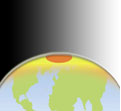
WMO says: 'climate' is average weather.
This website will provide information and ask, does science know what climate is?

| Reference links : www.bernaerts-sealaw.com www.arctic-warming.com www.1ocean-1climate.com www.seaclimate.com |
 |
| NEW 2009 |
 |
| www.arctic-heats-up.com |
Remarks on Climate and Climatologists by F. Kenneth Hare, 1978 & 1984
B-210
Canada’s most distinguished geographer and climatologists[1], the late Professor F. Kenneth Hare, explained in 1978 that climate was a layman’s word, and that the professional use is still erratic (1984), as can be read in the following two brief excerpts.
F. Kenneth Hare[2] on: Climate & Climatologists
“This is obviously the decade in which climate is coming into its own. You hardly heard the word professionally in the 1940s. It was a layman's word. Climatologists were the halt and the lame. And as for the climatologists in public service, in the British service you actually, had to be medically disabled in order to get into the climatological division! Climatology was a menial occupation that came on the pecking scale somewhat below the advertising profession. It was clearly not the age of climate”.
F. Kenneth Hare[3] on : DEFINITIONS OF CLIMATE,
Extract from section: Climatic Variability and Change[4]
“The word climate is often seen as ambiguous, because of confusion with related words like weather, or vague climatic conditions. In fact it is capable of fairly exact definition. In recent years, moreover, public usage seems to have moved closer to that of the professional.
In lay usage, climate usually stands for the expectation of weather on time-scales comparable with a human lifetime; it is the layman's sense of the sequence of weather he or she may expect at a given locality. As such it governs countless daily decisions, from choice of personal clothing to the work calendar of the farmer. Habitually this expectation is taken for granted. Only when unexpected weather occurs does the ordinary citizen become acutely aware of the stresses that the atmosphere's behavior can bring - sometimes to the point where the question is asked (as it is below): `is the climate changing?' This question arises from the suspicion that recent weather lies outside normal expectation, that is, outside the present climate.
Professional usage is still erratic, but usually starts with the same idea of expectation. It is assumed
- that a climate exists at any given moment; and
- that the integrated experience of the recent past specifies this climate.
We tend to assume that the near future will resemble this recent past. For lack of any better guide we accept a dictum attributed to Whitehead: how the past perishes is how the future becomes. We think it highly probable that past experience will repeat itself. In effect, we assume that the climate of today will endure for an undefined period.”
COMMENT : For Prof. F.K. Hare it seems it was easy to say concerning the word climate: In fact it is capable of fairly exact definition. However, 30 years have passed and neither he nor the FCCC, or WMO, etc has been coming up with something reasonable.
INFO:
The TIME published an article: “Another Ice Age?” in June 1974[5]; (Two extracts):
Whatever the cause of the cooling trend, its effects could be extremely serious, if not catastrophic. Scientists figure that only a 1% decrease in the amount of sunlight hitting the earth's surface could tip the climatic balance, and cool the planet enough to send it sliding down the road to another ice age within only a few hundred years.
University of Toronto Climatologist Kenneth Hare, a former president of the Royal Meteorological Society, believes that the continuing drought and the recent failure of the Russian harvest gave the world a grim premonition of what might happen. Warns Hare: "I don't believe that the world's present population is sustainable if there are more than three years like 1972 in a row."
Footnotes
[1] McGILL UNIVERSITY, 2002, RESOLUTION ON THE DEATH OF PROFESSOR F. KENNETH HARE; http://www.mcgill.ca/files/senate/2002-12-04.txt
[2] F. Kenneth Hare, 1979, “The Vaulting of Intellectual Barriers: The Madison Thrust in Climatology”; Bulletin American Meteorological Society; Vol. 60, No.10, October 1979, Pages 1171 – 1174.
[3] F. Kenneth Hare; ca. 1984; Climatic Variability and Change, “SCOPE 27 Climate Impact Assessment - Studies of the Interaction of Climate and Society”, Preface by: ROBERT W. KATES; available via: http://www.icsu-scope.org/downloadpubs/scope27/contents.html
[4] Ditto: Material: http://www.icsu-scope.org/downloadpubs/scope27/chapter02.html
[5] Material available via: http://www.time.com/time/printout/0,8816,944914,00.html
|
Essay 2010 Is the term ‚climate’ too unspecific? Pages 10 | ||
Chronicle Archive |
||
| Want to comment? Email us! |
||
| Previous archives
Year 2010 Year 2009 |
||
| Essays from 1992 to 1997 on CLIMATE by Dr. Arnd Bernaerts |
||
| 1994 “Legal Means for Understanding the Marine and climatic Change Issue”, p.24 presented at the 28th Annual Conf. of the Law of the Sea Institute, Honolulu |
||
| 1992 “Conditions for the protection of the global climate”, p.53 presented at GKSS Research Center Geesthacht |
||
1997 www.1ocean-1system.de |
||
| Four short texts 1994 Moscow 1994 LOS 1993 LOS 1992 Nature |
||
Kindly indicate:
www.whatisclimate.com
as source
whatisclimate.com